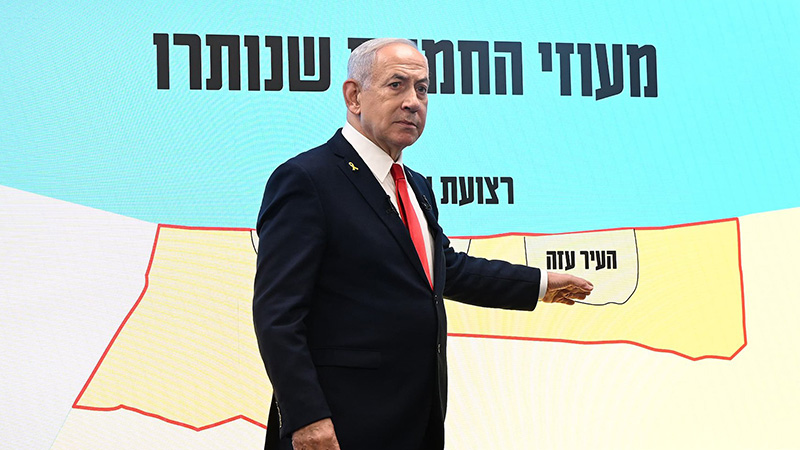
In a highly publicized foreign press conference in Jerusalem on August 10, 2025, Prime Minister Benjamin Netanyahu revealed with uncharacteristic clarity his political vision for a postwar Gaza Strip. With his approach to Gaza endorsed by continued support from the Trump administration, Netanyahu shared five vital components of his military and political strategy for the besieged territory.
First, Netanyahu insisted at the press conference that "discussions are underway" in his government to develop "creative" - read 'military' - new methods to free the remaining hostages in Gaza. His insistence on a military solution ignores the fact that 140 of the 251 hostages have been successfully released through direct and indirect political talks with Hamas. The political opposition in Israel - as well as, most significantly, the families of the hostages - has questioned Netanyahu's commitment to freeing the hostages, bluntly accusing the prime minister of giving up on a negotiated release.
Indeed, Netanyahu and his cabinet colleagues have repeatedly subverted ongoing negotiations mediated by Qatar and Egypt for a hostage exchange deal between Hamas and Israel. The unreasonable - and unachievable - demands of the Israeli government include the total disarmament and eradication of Hamas as a military and political entity in the Gaza Strip, without even ending the war. The Israeli government now plans to widen its military campaign in Gaza by mobilizing 60,000 additional army reservists. These plans contradict the advice of Israel's own military and intelligence services and have been publicly condemned by France, the UK, and Germany, in addition to UN officials concerned over their repercussions and potential violations of international law.
Second, Netanyahu confirmed that the military offensive planned by Israel - and supported by the Trump administration - will target the Strip's two remaining Hamas strongholds, located in Gaza City and the refugee camps of central Gaza. US President Donald Trump quickly agreed that the hostages would be released only "when Hamas is confronted and destroyed." Netanyahu asserted that his offensive would be "the best way to end the war speedily." He used emotional terms devoid of moral or political equivalence in stating that "We are facing Neo-Nazis...We are not going to leave the remainder of the Nazi army in the equivalent of Berlin."
This is indeed a strange objective. The Israeli military and security leadership have repeatedly declared that Hamas has been severely damaged and militarily degraded beyond expectation in the twenty-two months of brutal fighting. Yet Netanyahu clung to his threat to invade Gaza City and the refugee camps in central Gaza despite Hamas' acceptance of Special Envoy Steve Witkoff's ceasefire and hostage exchange deal.
Third, the Israeli prime minister declared unequivocally that neither Hamas nor the Palestinian Authority - which currently governs the West Bank - would be allowed to control Gaza after the war. This insistence is significant considering mounting international pressure on Israel to end the war in Gaza and place the Strip under Arab or international control, including potentially a reformed Palestinian Authority in Ramallah.
As an Israeli politician, Netanyahu is entitled to pursue a role for his party, the Likud, and its political coalition in the upcoming Israeli elections. He is not entitled - politically, legally, or even rationally - to dictate who should lead Palestinians in Gaza or the West Bank. As the occupying power in Palestine, Israel is obliged to shoulder the responsibilities incumbent upon an occupier as stipulated in international law. These responsibilities do not include imposing its own sovereignty or its preferred leadership on the occupied Palestinian territories.
Fourth, Netanyahu revealed in more detail than in past statements that Israel intends to establish its own security zone surrounding the Gaza Strip to be run by "a civilian administration that seeks to live in peace with Israel." He specified that the next authority in Gaza would not "educate for terrorism or launch terrorism." Netanyahu seems oblivious to the dismal failure of similar efforts by Israel between 1978 and 1984 to impose groups of collaborators known then as " village leagues" to replace the Palestine Liberation Organization in the West Bank. That heavy-handed method failed forty years ago in the West Bank; it will face similar disdain and rejection by Gazans today.
Fifth, Netanyahu credited his government's recent efforts in ending the "humanitarian crises" in Gaza through the safe corridors that it designated and the air-drops that "prevented hunger" by lowering the price of food in the territory. The prime minister informed the world press that "two million people are getting access to aid, and the only ones being deliberately starved are the hostages." Yet numerous specialized UN agencies and non-governmental organizations insist that famine and starvation in Gaza continue to accelerate, showing no signs of abatement despite these Israeli and Western attempts at airdrops and other ineffective methods of delivering food.
This week, the United Nations Relief and Works Agency (UNRWA) confirmed that "for over 150 days, not a single truck from UNRWA has been permitted to deliver food, medicine, or other essentials into Gaza." Over 100 international NGOs signed a letter saying that their humanitarian supplies remain held by the Israeli authorities at the port of Ashdod or at the Rafah crossing with Egypt. This denial of access, despite the media hype around the airdrop operations, continues to cost precious lives among civilians in Gaza every single day.
The views expressed in this publication are the author's own and do not necessarily reflect the position of Arab Center Washington DC, its staff, or its Board of Directors.
Featured image credit: Haim Tzach, GPO